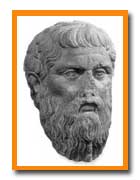
Plato (428-354 BCE)
Athens, Greece
Plato was born to a wealthy family and was a student of the great
philosopher Socrates. After the death of his teacher Plato
founded the first university, called the Academy. There,
students focused on important questions such as "What is
the self?" and "What is human nature?" Aristotle
was one of his star pupils. Plato believed that there are
unchanging truths about all things for example, there are many
breeds of horses, but there are definite things that define "horseness"
about them all. He also believed that a philosopher's job
is to open people's eyes to the truth and help them strive to
be good and fair. Plato believed that men and women had the same
intellectual powers, and was one of the first to teach that women
should receive the same education as men. Plato also believed
in an unseen world where there existed perfect models of all things
on Earth. He also held that society would be at its best,
and remain stable and just, with philosophers in power. Plato
wrote down his teachings in the form of conversations called Dialogues.
The most famous of his Dialogues are "The Republic"
and "The Death of Socrates."
Classroom
discussion questions:
If Plato were alive today, how would he answer
the question, "What is the meaning of life?"
Can there be in reality an ideal society
that Plato describes? What would this society look like?
What would our government look like today
if it were run by philosophers as Plato proposed?
For
more information about Plato, follow these links:
http://www-gap.dcs.st-and.ac.uk/~history/Mathematicians/Plato.html
http://www.rit.edu/~flwstv/plato.html
http://classics.mit.edu/Browse/browse-Plato.html
http://www.wsu.edu:8080/~dee/GREECE/PLATO.HTM
http://www.philosophypages.com/ph/plat.htm
http://php.iupui.edu/~cplaneau/plato_03_30.htm
If
you have suggestions for the Philosopher of the week, please e-mail
us at: info@philosophyslam.org
TO LEARN ABOUT OUR
OTHER "PHILOSOPHERS OF THE WEEK" CLICK ON ONE OF THE
LINKS BELOW.
• Dewey •
Socrates • Aristotle
• Confucius • Rand
• Aquinas • Locke
• Camus • Cavendish
• Sartre •
Rousseau • King• Descartes
• Spinoza • de
Beauvoir • Nietzsche
• Kant •
Hypatia • Thoreau
•
BACK
TO TOP

